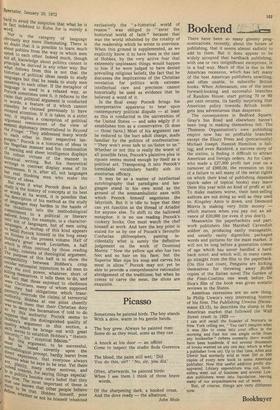Bookend
There have been so many gloomy prognostications, recently, about the future of publishing, that it seems almost sadistic to add to them. But it does appear to be widely accepted that hardback publishing, with one or two insignificant exceptions, is in a bad way. Much of this is due to the American recession, which has left many of the best American publishers unwilling, and often unable, to subscribe British books. When Athenaeum, one of the most forward-looking and successful branches of Random House, start getting 70 or 80 per cent returns, its hardly surprising that American policy towards British books gets less adventurous than desperate.
The consequences in Bedford Square, Gray's Inn Road and elsewhere haven't been long in making themselves felt. The Thomson Organisation's own publishing empire now has no profitable branches except the Ebury Press and (precariously) Michael Joseph. Hamish Hamilton is failing; and even Rainbird, a success story of the sixties, is finding it difficult to attract American and foreign orders. As for Cape, who made a £27,000 profit last year on a turnover of £900,00, the recession on top of a failure to sell many, of the serial rights on which their kind of publishing depends (quick sales of topical books) may leave them this year with no kind of profit at all. To make matters worse, their best-selling authors are not doing as well as they used to. Kingsley Amis is down, and Desmond Morris is making very little money — which matters when you pay out an advance of £20,000 (or even if you don't).
Meanwhile the paperbackers and partwork publishers like Marshall Cavendish soldier on, producing easily manageable, and usually easily digestible, packaged words and pictures for the mass market. It will not be long before a generation comes of age which has never handled a hardback novel; and which will, in many cases, go straight from the film to the paperback. (On this last count, Penguins are kicking themselves for throwing away 20,000 copies of the Italian novel The Garden of the Finzi-Continis one week before De Sica's film of the book was given ecstatic reviews in the States.
American recessions are no new thing. In Philip Unwin's very interesting history of his firm, The Publishing Unwins (Heinemann £3.15), he describes the slump in the American market that followed the Wall Street crash in 1929 — I can still recall the founder of Norton's in New York telling me, "You can't imagine what it was like to come into your office in the morning and find not one single order from any bookseller" (where normally there would have been hundreds, if not several thousands of books wanted on any one day, which is what a publisher lives on), Up to that time, Allen and Unwin had normally sold at least 250 or 500 copies of every new book to some American publisher. Now this useful addition profit disappeared. Library expenditure was cut, booksellers went out of business and several London publishers went into liquidation, leaving many a our acquaintances out of work. But, of course, things are very different now.
Bookbuyer










































 Previous page
Previous page